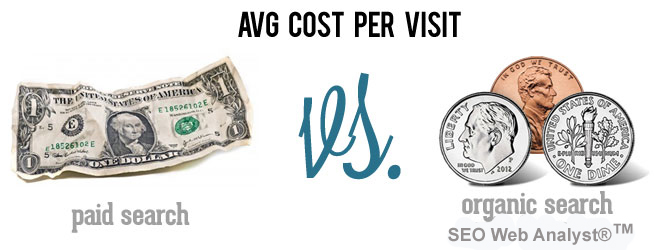

2024-10-13 00:00:00 | 1358 ![]() Print
Print ![]() PDF
PDF

Organic traffic refers to the visitors who come to your website from natural or unpaid sources, such as search engines, blogs, social media platforms, or referrals from other websites. Organic traffic is valuable because it indicates that your website is relevant, trustworthy, and authoritative in your niche and that your content is useful and engaging for your audience. Organic traffic also tends to have a higher conversion rate, as people who find you organically are more likely to be interested in your products or services. Additionally, organic traffic is more sustainable and cost-effective in the long run, as you don't have to pay for every click or impression.
A marketing strategy in today's world takes a lot of planning and an understanding of your own goals foremost. In a perfect world, you would have a dedicated person to handle your media strategy or utilize a reputable advertising agency to assist in a media plan. Social media was once thought of as a strictly organic platform but all of these now integrate paid ads that allow you to reflect the organic nature of the individual platform but target your specific audience to see your messages. As is always the case a best practice is to utilize as many platforms and methods as possible and always have a call to action. That allows you to quantify your results, test multiple ad types, and make adjustments to optimize your results.
Organic traffic is your website’s best friend. It shows you're creating content that genuinely resonates, building trust and authority in your niche. Plus, it’s cost-effective and sustainable, meaning your efforts pay off over time. Focus on engaging your audience, and watch your traffic—and conversions—grow!
Paid traffic refers to the visitors who come to your website from paid sources, such as online ads, sponsored posts, or influencer marketing. Paid traffic is useful because it allows you to reach a large and targeted audience quickly and easily, and to generate immediate results. Paid traffic can also help you boost your brand awareness, test new products or offers, or drive more sales during peak seasons or promotions. Furthermore, paid traffic can complement your organic efforts, as it can increase your exposure, drive more traffic to your website, and improve your SEO ranking.
Paid ads are highly effective once they are tested and optimized. This can take a few months and an active review of your dashboard to find the best search terms, demographics, and geographic, areas that yield a return on your investment. Since the marketplace is always moving and adjusting to economic and geopolitics, it's important to not judge a campaign over a short period. There are useful tools within most dashboards to give you information on the top search words and phrases in your industry and geography, you can make adjustments easily and even ad ( negative keywords) to filter out an audience that is not relevant to your most highly desirable customers.
I find Google shopping ads most helpful when you have a dedicated product providing a service or on-trend. Leads that come in with questions often create more opportunities to provide information for purchasing decisions. Shopping ads give users a good spread of comparative products and well dictate price values for making a good decision.
Paid traffic is when you pay to put your ads on various online platforms to get more people to visit your website or online business. It's a handy way to reach more potential customers and increase your online presence. But, it can be expensive if you're not careful. You need a solid plan, keep a close eye on the results, and make adjustments as needed to get the most bang for your buck.
Finding the right balance between organic and paid traffic sources for your online store depends on your goals, budget, industry, and competition. To start, set a clear and realistic goal for your traffic generation strategy. Then analyze your current traffic sources and performance to identify strengths and weaknesses. Identify your target audience and their behavior, allocate budget and resources accordingly, and experiment with different organic and paid methods. This could include SEO, content marketing, social media, email marketing, Google Ads, Facebook Ads, etc. Monitor your ROI and adjust your strategy based on data and feedback to get the best results.
Recommended Read: 7 Ways To Use Email To Boost Organic Traffic
The previous paragraph is spot on and should be the standard that you utilize on every campaign you run. Do not be intimidated by running paid ads. All of the platforms are very user-friendly and with a little practice, you can achieve more than you can imagine.
Balancing organic and paid traffic sources can offer several benefits for your online store, such as increasing your reach and visibility, improving your credibility and trust, diversifying your risk and opportunity, and maximizing your conversion and revenue. By using both organic and paid methods, you can attract more visitors from different sources and channels, enhance your reputation in your niche, reduce vulnerability to changes in the online environment, target different stages of the customer journey, and optimize your conversion funnel. Additionally, you can increase your average order value, repeat purchases, and customer lifetime value.
Everything in life and in marketing as well should utilize balance. If you don't test each method you might never know what is best for your business. For all of you ' I count on word of mouth ' businesses out there, you are your competitor's best friend. While you are sleeping they will be targeting your existing customers with strong value propositions that will erode your core customers.
I agree. If the question was dictated with a how-to model, I would recommend utilizing applied experiences through the application of case studies and sharing customer journey stories. Customers in business are often happy to share user-based experiences for the mention.
Balancing organic and paid traffic sources can be challenging, requiring careful budget allocation and ROI tracking. You must also produce quality content and campaigns that are relevant and engaging while differentiating yourself from competitors. Additionally, you must be flexible and agile to adapt to changes in customer behavior, market demand, industry regulations, or technology innovations. Managing these tasks requires careful planning and regular optimization to ensure success.
I don't see any challenges. Quality content and a strong call to action are the benchmark of all good advertising. The hard work is maintaining a great reputation with consistently superior customer service and doing what you say you will do.
Source: https://www.linkedin.com/advice/1/how-do-you-balance-organic-paid-traffic-sources

I am a seo web analyst and have a love for anything online marketing. Have been able to perform researches using the built up internet marketing tool; seo web analyst as a case study and will be using the web marketing tool (platform).
How To Optimize Cache Performance via HTACCESS Apache Server
How To Fix GA4 Showing Wrong Domain Traffic
How To Reactivate Google Adsense Account
How Do You Write Pitch Deck That Wins Investors
Effective Lead Magnet Funnel Examples For Businesses
How To Promote FMCG Products Using Digital Marketing
The Main Objectives Of SEO in Digital Marketing
How Artificial Intelligence Is Transforming Digital Marketing
Google CEO Sundar Pichai: Search will profoundly change in 2025
3 Most Important Business Growth Strategies